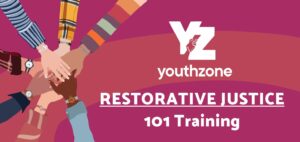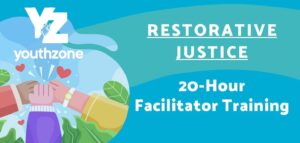YouthZone is the Community's Restorative Justice Expert
Restorative Justice is not reserved for youth who have gone through the Juvenile Justice System. This style of healing can be used for families, schools, and communities that need a victim-centered approach to resolution. If you have any interest in participating in Restorative Justice or volunteering please call YouthZone today and ask us how Restorative Justice can benefit you!
What is Restorative Justice?
Restorative Justice is a process that focuses on rehabilitating offenders through reconciliation with victims and their community. Restorative Justice seeks to repair harm by giving victims the chance to share how they have been harmed, and by allowing offenders to take accountability for their actions and repair the harm caused by crime.
Why is Restorative Justice Important?
Youth offenders who are detained are five times more likely to be detained for future criminal behaviors. However, 86% of the youth who complete the Restorative Justice process do not re-offend. Restorative Justice allows the offender to re-integrate into a community and can help reduce the dangers of perceived stigmas. This process also allows the victim to have a say in how they feel the offender could best repair the damage done to the community.
YouthZone Services:
Restorative Conferences
YouthZone uses a Restorative Conference, where the offender and their supporters, the victim and their supporters, a volunteer community member, law enforcement officers, and two trained facilitators meet face-to-face. The offender explains their story, and the other members of the conference explain the effects that the offender’s actions had on them. This process paves the way for a contract which is designed to meet the needs of each party involved.
Circles
YouthZone also provides Community Building Circles. Circles bring together individuals who would like to engage in community building, conflict resolution, and relationship building. Circles foster cooperation and strengthen connections within the group.
School Trainings
YouthZone provides support in the implementation of Restorative Practices in schools. This entails training for staff and assistance in building an RJ process based on the needs of the individual community.
Why YouthZone?
YouthZone has been facilitating Restorative Justice Conferences for youth ages 10-20 years old since 1999. When kids come to YouthZone, they receive an-in-depth evaluation that identifies risk factors and connects the youth and family with the services they need. Restorative Justice is just one of the services that a youth can be referred to. In order to reach more of the community, we urge you to volunteer or donate today.
The History of Restorative Justice at YouthZone
As legend goes, it all started around Bud and Sharlene Collett’s kitchen table in Rifle in 1976. YouthZone began as Let’s Work it Out and later became Garfield Youth Services followed by its present name of YouthZone .
In 1993, Garfield Youth Services offered a program called “Victim-Offender Mediation.” The program looked a little different than it does today. Instead of a circle, two mediators were seated across the table from the youth. The program’s focus was on repairing harm through restitution. The group found that victim involvement led to restoration and the program evolved into Restorative Justice, headed by Barb Lorah.
Some of the original volunteers included Marion Smith, Jan Kaufman, and Eddi Vanderhoof. Barb and Bill Lorah, Alec Raffin, Jean Heyser, Patty Phelps, Lisa Franke, and Debbie Wilde acted as facilitators.
Barb remembers one of the early circles that had a big impact on the youth offender. A 12-year-old boy who loved art. To repair the harm, he wanted to paint miniature pictures and use them as prizes at Sunnyside Retirement Center’s weekly Bingo game. He enjoyed helping run the games and awarding prizes so much that he continued to paint pictures and volunteer for a few years after his two-month obligation was fulfilled.
Thanks to all the hard work of the many past employees and volunteers, Restorative Justice has become an important program at YouthZone that helps kids, families, and victims in our communities.
How can I make a referral?
To make a referral to YouthZone’s Restorative Justice Program, Please contact Lyn Williams at [email protected].
How can I be involved?
To become a volunteer community member, surrogate victim or facilitator, please contact YouthZone's Restorative Justice Coordinator Chelsea Smith at [email protected].
Upcoming Restorative Justice Events
FREE RJ 101 Bilingual Training

WHEN: Thursday, April 18th 9:00-11:00 am
WHERE: The Glenwood Springs YouthZone office
413 9th St., Glenwood Springs, CO 81601
- Dinner provided
- Childcare available upon request
- Transportation support available upon request
WHO IS IT FOR?
- Community - Parents - Teachers Law Enforcement
- Any adult wanting to know more about Restorative Justice
This training is for anyone interested in learning more about the basics and history of Restorative Justice, how it is implemented, who can participate, and how to get involved as a Restorative Justice volunteer. It is also a prerequisite for anyone interested in participating in the Restorative Justice Facilitator Training.
WHAT TO EXPECT: To enhance and amplify restorative justice in the Roaring Fork and Colorado River Valleys. Dinner provided. Childcare and transportation support available upon request.
HOW: Sign up at this link: Free Bilingual RJ 101 Training or email Chelsea Smith at [email protected]
This training will be led by Deb Witzel, the co-producer and host of The Restorative Justice Chronicles Podcast and the first Colorado Coordinator for Restorative Justice in the State Court Administrator’s Office.
FREE RJ Facilitator Training

WHEN: Thursday, April 18th – Saturday, April 21st
Thursday 5:00-8:00pm, Friday and Saturday 9:00am-5:00pm
WHERE: The Glenwood Springs YouthZone office
413 9th St., Glenwood Springs, CO 81601
- Breakfast, lunch & snacks provided.
- Transportation, childcare and translation services available upon request
This is a 20-hour intensive training presented by Deb Witzel. This training will provide participants with the tools they need to facilitate real-world RJ processes on their own, and/or co-facilitate with us at YouthZone.
WHO IS IT FOR?
- Community - Parents - Teachers - Law Enforcement
- Any adult with existing experience in Restorative Justice Practices, either through previous YouthZone training or other experiences.
WHY:
To enhance and amplify Restorative Justice in the Roaring Fork and Colorado River Valleys. Learn tools needed to facilitate real-world RJ processes on your own or with YouthZone.
HOW: Sign up at this link: Free Restorative Justice Facilitator Training or email Chelsea Smith at [email protected]
This training will be led by Deb Witzel, the co-producer and host of The Restorative Justice Chronicles Podcast and the first Colorado Coordinator for Restorative Justice in the State Court Administrator’s Office.
